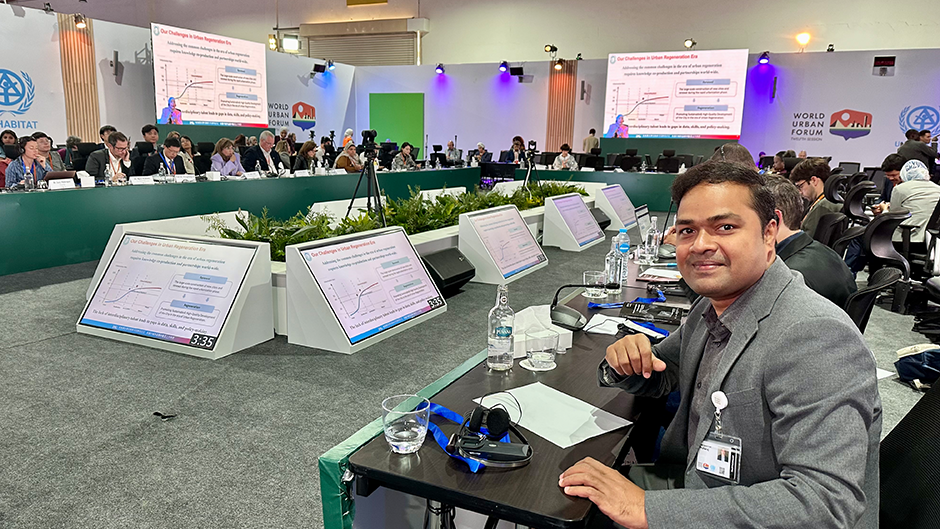The University of Miami has achieved a milestone in its commitment to advancing sustainable urban development, becoming an official member of Habitat UNI, the United Nations Habitat University Initiative. This recognition places the University among a select group of academic institutions worldwide collaborating to address urban challenges in a rapidly evolving world.
The honor comes thanks to the efforts of Sarbeswar Praharaj, an assistant professor in the Department of Geography and Sustainable Development and the School of Architecture. With expertise spanning urban planning, sustainable development, and resilience, Praharaj played a pivotal role in advocating for the University’s inclusion in the prestigious network.
Praharaj recently represented the University at the 12th World Urban Forum in Egypt, a global event organized by the United Nations Human Settlements Program. The forum convenes policymakers, researchers, and practitioners to discuss innovative strategies for managing urbanization and achieving sustainable development.
“Rapid urbanization is one of the defining challenges of our time,” Praharaj said. “While developed nations grapple with maintaining urban vibrancy and addressing climate risks, developing regions face the daunting task of managing accelerated transitions from rural to urban living. This forum brings together a global community to find solutions that work for all.”
One of the forum’s standout initiatives, Habitat UNI, connects more than 147 universities worldwide to promote research, inform policy, and encourage the exchange of knowledge in sustainable urbanism. Until now, the University had not been part of the influential network. Motivated by Miami’s unique role as a global city at the forefront of climate adaptation and urban innovation, Praharaj worked with the School of Architecture’s leadership to secure Habitat UNI membership.
“Miami’s experience with challenges like sea level rise and resilience planning positions us as a valuable contributor to the global conversation on sustainable cities,” Praharaj said. At the World Urban Forum, he presented the University’s interdisciplinary work in urban resilience and sustainable development. His advocacy was instrumental in demonstrating the University’s potential to contribute to the World Urban Forumi’s mission.
As part of Habitat UNI, the University gains access to a global network of universities engaged in advancing sustainable urbanism. Faculty members and students will now have opportunities to collaborate with peers worldwide, share innovative approaches, and contribute to research that informs urban policies globally.
For example, the University’s work through the Frost Institute for Data Science and Computing on mapping informal settlements in Latin America could serve as a model for addressing similar challenges in other rapidly urbanizing regions. “Joining Habitat UNI allows us to integrate global perspectives into our academic and research initiatives while sharing Miami’s expertise in climate resilience with the world,” Praharaj said.
Praharaj also participated in the forum’s closing roundtable discussion, alongside representatives from 147 other universities, to synthesize key insights into actionable strategies for sustainable urbanization.
“This recognition is a testament to the innovative work being done across the University of Miami, especially through the MPS in Urban Sustainability and Resilience Program,” he said. Professor Praharaj is the Director of this STEM-designated interdisciplinary program that equips students and practitioners to design and advance sustainable and resilient communities for weathering climate change and urban challenges.
Through Habitat UNI, the University is further poised to influence global urban policy and inspire the next generation of leaders to create sustainable, equitable, and resilient cities. Praharaj will continue to enage in this work during the ninth annual Smart Cities MIAMI Conference, which will take place on the Coral Gables Campus in April 2025.

